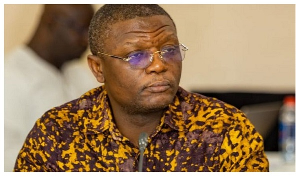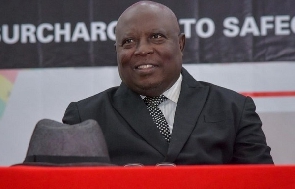Cape Coast, Nov. 09, GNA - Chief Emeka Anyoaku, Former Secretary-General of the Commonwealth, on Thursday, attributed Africa's under-development to the numerous military interventions during post-independence and one-party rule era.
He said, "Nothing has done more to destroy Africa, than one-party rule and military dictatorship".
Chief Anyoaku, made the observation when delivering the second in the three-day lecture at the on-going Seventh series of Kwame Nkrumah Memorial Lectures at the University of Cape Coast (UCC). He was speaking on the topic "The cramping of the will" for the Lectures under the theme "The condition of Africa: A cramp in the will". Chief Anyoaku regretted that by January 1968, there had been 64 coups, attempted coups and mutinies, and stressed that the military had been largely responsible, not only for the destruction of the democratic evolution on the continent but also its economic decline.
He noted that in his view, the problems that precipitated these coups could have been resolved by the politicians or by politicians and elders in the society, since the coup plotters fell victim to what they claimed they sought to eliminate.
Chief Anyoaku emphasized that Africa's experience with coups, had reinforced his belief that even the most benevolent coup cannot be a worthy substitute for governance.
He said the emergence of one-party rule, which choked off initiative and productivity, enabled a golden age of sycophancy, resulted in a one-man rule and bred mediocrity.
This he said, facilitated a peculiar brand of corruption, with some leaders making themselves life presidents, with the argument that multi-party politics, stimulated ethnicity, while one-party rule was in keeping with African traditional politics.
Chief Anyoaku noted that these two factors were the beginning of the loss of Africa's professionals as those who could not cope with the situation went into exile.
He said other non-African factors for Africa's decline, were the demarcation of national boundaries by the colonial powers which had resulted in territorial disputes, such as between Ethiopia and Eritrea, but was happy that due to the "wisdom of the leaders and the people", this had been avoided between Ghana and Togo. Chief Anyoaku said the fall of Africa's commodity prices on the world market, also left the continent at the mercy of the international financial institutions like the IMF, which imposed conditions like devaluation and structural adjustment programmes, that rather impinged on the development of important sectors like health and education. These conditions, he said, were imposed with no regard to the peculiarities or special needs of a country, and that in view of the high levels of corruption, conditions of good governance and accountability were also prescribed.
He said having failed to produce and export, most of Africa was reduced to aid dependency and debt burden, and this had prevented the industrialization of the continent, since it had become impossible to accumulate the necessary resources.
Chief Anyoaku said the problem of capital accumulation was exacerbated by the fact that about 40 per cent of Africa's savings were outside the continent, as compared to South and East Asia which had only six and three per cent of their savings outside. He emphasized, that what Africans should therefore be concerned about now, was lost generations and not lost decades, since what was happening today was a greater infamy and was self-imposed. "If we fail to halt it, our claim for respect and dignity would be received with ridicule," he declared. 09 Nov. 07
General News of Friday, 9 November 2007
Source: GNA
















